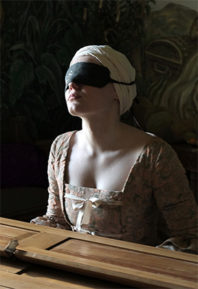
Austrian auteur Barbara Albert chooses deliberately how to depict Maria Theresia von Paradis (Maria Dragus). She’s a piano player, we should see her hands. But instead it’s just a close-up of Resi’s face during the film’s first scene. It recalls a discomfort in seeing the eyes of a person who doesn’t see things the way most people do. That’s if they can see at all. And even if we can’t see her hands we can feel them, as Resi moves left and right. She reaches on for dear life for the keys so she can play in front of audiences like a prodigy. And this close-up shows her lack of agency, a world boxing her in. A woman with impaired vision living in 18th-century Vienna.
Resi’s stage parents (Lukas Milo and Katja Kolm) want more for their daughter. She can’t just have her fame as a pianist with impaired vision. They want her to gain back the sight that she lost when she was three. And after going through many doctors, they try Dr. Franz Anton Mesmer (Devid Striesow). Though his methods sound pseudoscience-y even for the standards of their time, they actually work on Resi. But here’s a plot twist so unbelievable if it wasn’t maybe true. Regaining her sight is making her musical abilities weaker, and she has to choose between the two. Stuffy period piece aside, it shows the complexity of Resi’s life, her disadvantages and surprising advantages. Her struggle is relevant for people living today.
- Release Date: 9/8/2017

